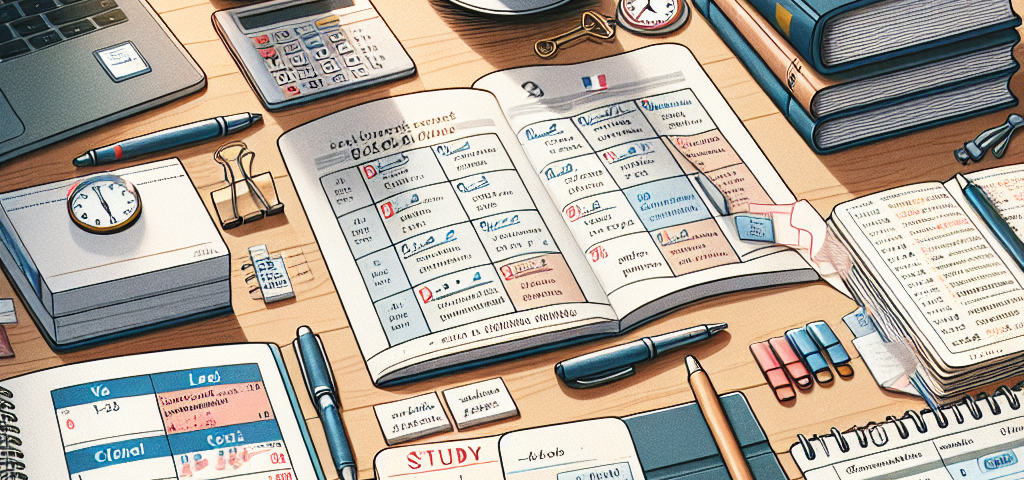
From Basics to Brilliance: Elevate Your French Grammar Skills
May 30, 2025
Boost Your French Speaking Skills: Fun Activities to Try Today!
May 30, 2025
Preparing for a French exam can be both exciting and daunting. A well-structured study plan not only helps you manage your time effectively but also boosts your confidence as you approach the exam. Here’s how to create a personalized study plan that suits your needs and helps you ace your upcoming French exam.
Step 1: Assess Your Current Level
Before diving into your study plan, it’s essential to evaluate your current proficiency in French. Take a practice test or review past quizzes to identify areas where you excel and those that need improvement. Pay special attention to:
- Vocabulary
- Grammar
- Listening comprehension
- Speaking skills
- Writing abilities
Step 2: Set Clear Goals
Once you have a good understanding of your strengths and weaknesses, set specific and achievable goals. These could include:
- Expanding your vocabulary by a certain number of words per week.
- Mastering specific grammar concepts.
- Practicing speaking for at least 15 minutes every day.
- Completing a set number of practice exercises each week.
By setting clear objectives, you can focus your study efforts more effectively.
Step 3: Organize a Study Schedule
Creating a timetable is crucial for keeping your study sessions organized. Here’s how to break it down:
1. Determine Your Study Duration
Identify how many weeks or days you have left until your exam. Divide this timeframe into smaller study blocks. For example, if you have four weeks, you could focus on different topics each week.
2. Allocate Time Each Day
Consistency is key. Dedicate a specific amount of time each day to studying French, ensuring you include different activities to cover all aspects of the language. For instance:
- Monday: Focus on vocabulary (1 hour)
- Tuesday: Grammar exercises (1 hour)
- Wednesday: Listening practice (30 minutes) and speaking practice (30 minutes)
- Thursday: Writing exercises (1 hour)
- Friday: Review and practice tests (1 hour)
- Saturday: Conversation with a partner or tutor (1 hour)
- Sunday: Rest day or light review (30 minutes)
3. Include Breaks and Flexibility
Be sure to include short breaks during your study sessions to avoid burnout. Flexibility in your schedule is also important; life can be unpredictable, so allow for adjustments as needed.
Step 4: Choose Effective Study Materials
Select various materials and resources to enhance your learning experience:
- Textbooks: Choose textbooks that align with your exam format.
- Online Resources: Utilize websites, apps, and YouTube channels dedicated to learning French.
- Flashcards: Use flashcards for vocabulary building.
- Language Exchange: Engage with native speakers for practical speaking practice.
- Practice Tests: Find past papers or sample tests to familiarize yourself with the exam format.
Step 5: Monitor Your Progress
Regularly assess your understanding and progress towards your goals. This could involve:
- Weekly quizzes to test your knowledge.
- Analyzing practice test results to focus on weak areas.
- Reflecting on what study techniques are working and what may need to change.
Step 6: Engage in Active Learning
To reinforce your learning, use active methods such as:
- Speaking aloud whenever you practice vocabulary or grammar.
- Writing essays or journal entries in French.
- Listening to French music, podcasts, or watching French films with subtitles.
- Joining study groups where you can discuss topics and practice speaking.
Step 7: Prepare for Exam Day
As the exam date approaches, begin to focus on exam strategies:
- Simulate Exam Conditions: Take practice tests in a quiet, timed setting.
- Review Key Points: In the final days, focus on summarizing key vocabulary and grammar rules.
- Stay Relaxed: Engage in relaxation techniques like deep breathing or meditation to keep stress at bay.
Conclusion
Creating a study plan for your French exam doesn’t have to be overwhelming. By assessing your current skills, setting clear goals, organizing a structured schedule, choosing effective materials, monitoring your progress, and engaging in active learning, you’ll be well-prepared and confident on exam day. À vous de jouer! (It’s your turn to play!)

